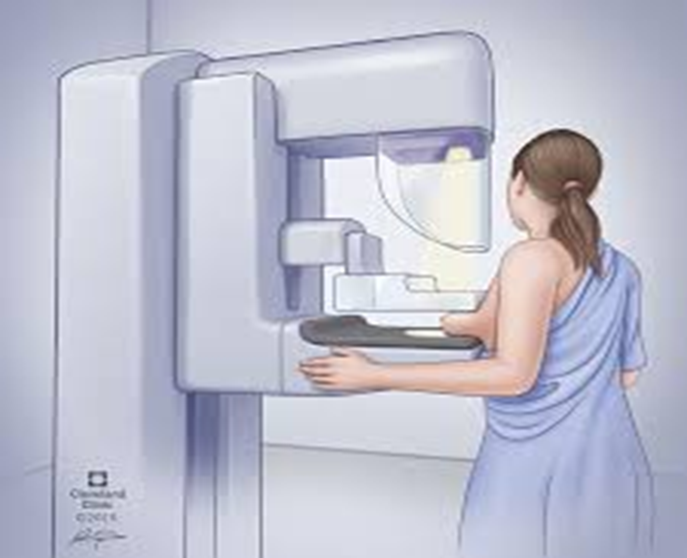While conducting the health assessment, the nurse instructs the client about secondary prevention activities. What information did the nurse most likely provide to this client?

The immunization schedule recommended for the client's age.
The need for regular mammogram screening to identify breast cancer lesions.
The need for consistent use of seat belts when in a motor vehicle.
The impact of annual vision examinations on personal health and safety.
The Correct Answer is B
Choice a reason:
Immunization schedules are typically considered a part of primary prevention. They are intended to prevent diseases before they occur by using vaccines to provide immunity against infections.
Choice b reason:
Regular mammogram screenings are a form of secondary prevention. They are used to detect breast cancer lesions early before symptoms appear, which can lead to more effective treatment and better outcomes.
Choice c reason:
The consistent use of seat belts is a primary prevention strategy. It is a proactive measure to prevent injuries in the event of a motor vehicle accident.
Choice d reason:
Annual vision examinations can be considered part of secondary prevention if they are used to detect vision problems or eye diseases in their early stages. However, they can also be seen as primary prevention because they help maintain and protect eye health before issues arise.
Nursing Test Bank
Naxlex Comprehensive Predictor Exams
Related Questions
Correct Answer is A
Explanation
Choice A reason:
The primary purpose of health assessment is to collect, analyze, and interpret data to identify the patient’s health status and needs, as well as to develop and implement appropriate nursing interventions to address these needs. It is a systematic process that is fundamental in promoting the health and well-being of patients. This involves a comprehensive evaluation of the patient's physical, psychological, and social health. Gathering this information is crucial for creating a care plan that addresses the individual needs of the client.
Choice B reason:
While health assessments can aid physicians in diagnosing illness, they are not solely for the purpose of diagnosis without further testing. Health assessments may indicate the need for additional tests to confirm a diagnosis. The nurse's role includes supporting the diagnostic process, but it is not the primary purpose of health assessment.
Choice C reason:
Health assessments are not meant to be subjective or based on the nurse's personal views and beliefs. The assessments are conducted to objectively determine the health status of a client, which then informs evidence-based practice and care planning. Personal biases should not influence the management of a client's illness.
Choice D reason:
Making judgments about a client's lifestyle and behaviors is not the primary purpose of health assessment. While lifestyle and behaviors may be assessed as part of understanding the client's overall health status, the goal is not to judge but to understand how these factors may impact the client's health and to provide education and support for healthy changes if needed.
Correct Answer is D
Explanation
Choice a reason:
Bronchovesicular sounds are normal breath sounds heard over the main bronchus area and over the upper right posterior lung field. They have a medium pitch and intensity and are heard on both inspiration and expiration. Bronchovesicular sounds do not involve the change of vowel sounds during auscultation.
Choice b reason:
Bronchophony is the term used when the voice sounds are more clear and louder over the chest wall, usually indicating lung consolidation. However, it does not specifically refer to the change of vowel sounds from "ee" to "ay."
Choice c reason:
Normal voice resonance is when voice sounds heard through auscultation are muffled and indistinct. It does not involve a clear change in vowel sounds, which is what occurs with egophony.
Choice d reason:
Egophony is characterized by the change of the "ee" vowel sound to a nasal "ay" or "a" sound when auscultating the lungs. This phenomenon typically suggests lung consolidation, as might be seen with pneumonia.
Whether you are a student looking to ace your exams or a practicing nurse seeking to enhance your expertise , our nursing education contents will empower you with the confidence and competence to make a difference in the lives of patients and become a respected leader in the healthcare field.
Visit Naxlex, invest in your future and unlock endless possibilities with our unparalleled nursing education contents today
Report Wrong Answer on the Current Question
Do you disagree with the answer? If yes, what is your expected answer? Explain.
Kindly be descriptive with the issue you are facing.
